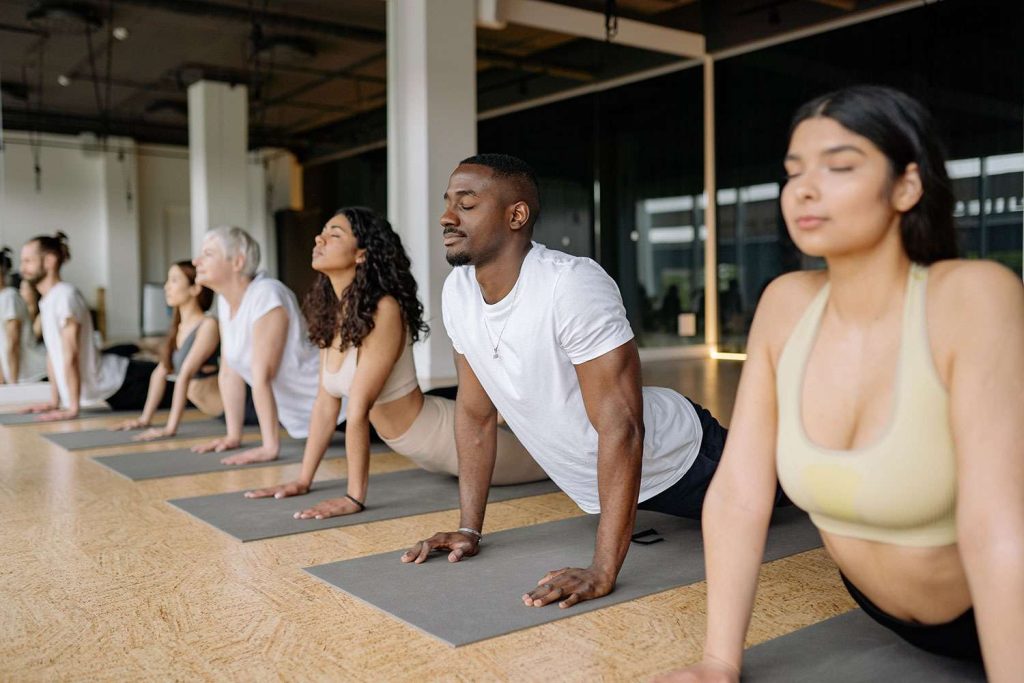The 12 benefits of Yoga Practice. Some are quite surprising!
The physical benefits of yoga are well publicised. But did you know that yoga can boost your mental wellness too? It can also ease the symptoms of diabetes.
Yoga is all about regulated breathing, controlled poses (Asanas) and relaxation. Which means that it can be incredible for you in many ways. Physically, mentally and spiritually. Our resident yoga expert Sarah Heap reveals her Top 12 Benefits of yoga practice and how it can enhance your daily life.

1. Improve your Flexibility and Mobility
You may not be able to touch your toes or do backbends in your first class. But even after just one yoga session, you might notice a gradual loosening of the joints and muscles. With regular home practice or classes, you should begin to see a noticeable improvement after three weeks.
2. Prevent Cartilage & Joint breakdown
Every time you practise yoga, you take your joints through their full range of motion. This delivers fresh nutrients to the cartilage in your joints, keeping them healthy and helping to prevent wear and tear.
3. Boost your Immune System
Regular yoga practice can boost your levels of haemoglobin and red blood cells. These are essential for your immunity. Contracting and stretching the muscles during your practice also drains lymph (a fluid rich in immune cells), helping you to fight infection.
4. Increase Blood Flow
Yoga is a low-impact way to get your blood flowing. This gets more oxygen to your cells, which function better as a result. It can also improve circulation, especially to your hands and feet.

5. Build Muscle Strength
When you build strength through yoga, it gives you a strong foundation. This is useful for your every day, functional strength and protects your body from conditions like arthritis and back pain. If you’re a gym goer who lifts weights, yoga practice will give you more flexibility.
6. Improve Posture
Sitting at a desk is famously bad for your posture. But the way you move or even sleep can affect it too. Back, neck and joint problems are all symptoms of bad posture. Happily, these are all things that yoga can improve. The forward folds, backbends and twists in your practice will keep your disks supple and strengthen the muscles around your spine.
7. Prevent Heart problems
When you regularly get your heart rate into the aerobic range, you lower your risk of a heart attack. While not all yoga is aerobic, if you do it vigorously or take a Vinyasa flow, Ashtanga or Power yoga class, it can boost your heart rate into the aerobic range.
8. Feel Happier
Yoga encourages you to focus on the present. This shifts the balance from the sympathetic nervous system, which controls fight or flight and causes anxiety and jitteriness when overstimulated, to the parasympathetic (your rest and digest centre). There’s also been extensive research that shows consistent yoga practice can improve the symptoms of depression.

9. Build Healthy Habits
A regular practice gets you moving and burns calories. The spiritual and emotional dimensions of your practice may help address any eating and weight challenges on a deeper level.
10. Lower Blood Sugar
Yoga has been found to lower blood-sugar by improving sensitivity to the effects of insulin and encouraging weight loss. By getting your blood-sugar levels down you decrease your risk of diabetic complications, such as heart attack, kidney failure and blindness.
11. Release Tension in your Limbs
Do you ever notice yourself holding your phone or steering wheel with a hard grip, or staring at your computer with a scrunched expression? These unconscious habits can lead to chronic tension and muscle fatigue, which can increase stress and worsen your mood. Yoga helps you tune in and release some of this tension.
12. Help you to Digest
Yoga is great for your digestive system and for detoxification in your body. By incorporating twisting poses into your practice, you’ll compress your organs to stimulate the gut. This gets rid of waste and toxins in your system.
Remember that the benefits of yoga can vary from person to person, and it is important to find a practice that suits your individual needs and preferences. Consulting with a qualified yoga instructor or healthcare professional can help you design a yoga routine that aligns with your goals and health requirements.






